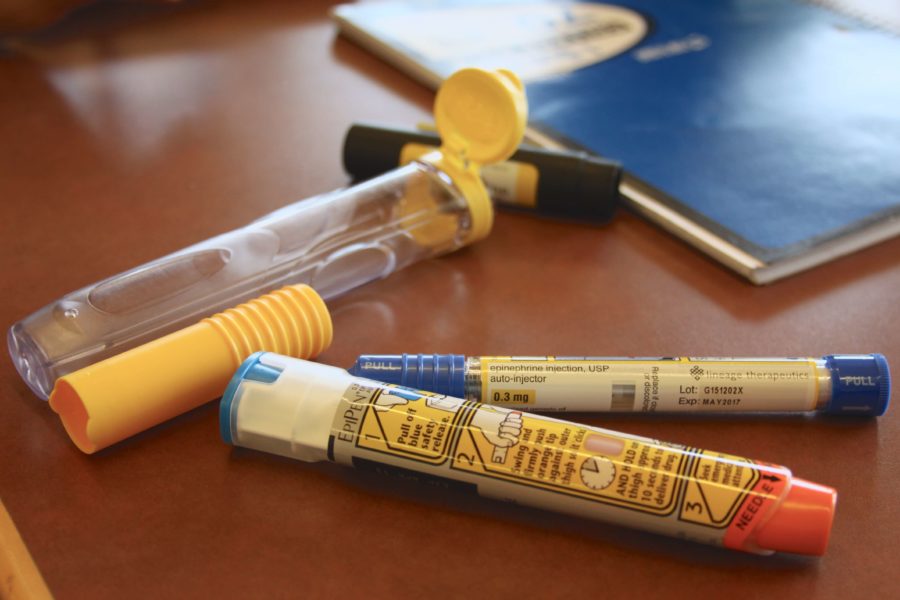The Death of Affordable Prescriptions
September 27, 2016
It’s a standard lunch day for you and your friends. The table’s already been reserved, you’re already deep into the mundane conversation of the day. All of a sudden, you realize something isn’t right. Your lips are beginning to puff up, and your throat is starting to itch. Next thing you know, your throat is closed up and you can’t breathe. Now, imagine not being able to pay for the very drug that would save your life.
This is increasingly becoming a real-life scenario.
Mylan, a major pharmaceutical company, has been dealing in recent months with the fallout of its decision to raise the price of EpiPens to $600 for a two-pack. Despite a great amount of criticism, Mylan’s CEO, Heather Bresch, has not backpedaled and is keeping the hefty price tag.
Anyone with severe allergies relies on epinephrine to counteract what could be a fatal reaction, and the price hike of EpiPens presents a developing and intensifying problem within the world of medicine: profit margins are valued more than the well-being of people.
Ever since Mylan’s acquisition of the EpiPen brand, its price has been slowly rising since 2007. After first increasing the price of EpiPens by about 30 percent, Mylan saw impressive profits of around $1 billion. Now up by over 400 percent, the new price means profit for the company has never been higher. Bresch’s own salary has skyrocketed by more than 600 percent, from $2 million to nearly $19 million.
When interviewed about the price raise, Bresch shifted blame to the healthcare system as a whole, insisting that the higher prices are to ensure Mylan profits after paying the middlemen who handle the product. However, these middlemen take a small percentage compared to Mylan, who walk away with nearly $300 in their pockets for every single EpiPen sold—all without breaking a single law.
It’s estimated that the epinephrine injectors sold only cost the company around $30 per unit to manufacture, a price that would be much easier to swallow for those who depend on it. However, low prices simply aren’t an option for them, even with insurance copayment. The typical copayment offered still only brings the price of a two-pack down to $300.
In some ways, different companies have allowed this price gouging to happen. Mylan holds a monopoly on the market of epinephrine injectors, due to a lack of viable alternatives. Being the owner of the EpiPen brand, they are allowed to raise the prices as much as they want, a situation not unlike the controversy surrounding Martin Shkreli last year, who marked a specialized drug up by over 5000 percent.
What makes this more of a problem than Shkreli’s case would be the fact that epinephrine isn’t a specialized drug; rather, it’s an incredibly common drug used for allergies practically worldwide. Even with the insurance copayment offered, some families would consider $300 for lifesaving medication a nightmare. This time, the fault lies with the insurance companies, as well as the drug company.
With allergic reactions, it’s either epinephrine or an ambulance ride to the hospital. With epinephrine administered earlier, symptoms are lessened, and the patient will typically require less medical attention. Without that EpiPen on-hand, there’s the cost of the ambulance ride, as well as any costs from the hospital. Insurance companies would have to pay for those hospital fees, which would certainly be over $600, so why would they not pay for the EpiPen? Ironically, this was pointed out by Shkreli himself, saying that “If you’re an insurer, you should love to pay for this stuff.” Overall, the companies spend less money, and people are less anxious about being able to afford epinephrine.
Lately, it’s become increasingly clearer that no amount of outrage from the public can do much to lessen the impact of rising drug prices. Empty promises are thrown around, and after a while, the public calms down, which may be the reason why nothing ever changes: there’s no proactive involvement from the public. Simply put, the public can’t throw a fit for all of two seconds and expect things to change.
Luckily, a recent proposal to add EpiPens to a federal list of preventative services would mean insurances companies are obligated to pay the full cost of the product for millions nationwide. Despite this potential solution, the issue of drug pricing is still in play, and Mylan is still able to charge ludicrous amounts. While some costs are understandable due to the relative amount of work that goes into development, epinephrine has been around for over 100 years, and there is absolutely no reason families should have to pay hundreds of dollars for a life-saving drug.






Zoe Wilber • Sep 27, 2016 at 9:12 pm
Firstly, I find it interesting that allergies are becoming an increasing phenomen in the American population–surely, this increase calls for a closer study as to what is causing these allergies to be perpetuated in our population. Furthermore, it is concerning to discover that Mylan is actually capitalizing on the weaknesses of others who suffer from moderate to severe allergies. What about these increased profits is ethical? Trick question: it’s not. Mylan may claim that the raise in prices are to continue meeting the business quota with the “middlemen” companies, but the facts clearly suggest otherwise as the Mylan CEO has enjoyed a 600% increase in salary. This lack of regard for human lives–really, basic needs–is demoralizing and disgusting. Here is a prime example of the faults within America’s capitalist system if I ever saw one.
Gabi Stoney • Sep 27, 2016 at 9:11 pm
I find it really upsetting how the CEO of Mylan is profiting off something people cannot control. The fact that her salary jumped $17 million, nearly 600 percent, by raising prices for her product is disgusting. How can someone stand for a company that is meant to save lives but instead feed off those who have to pay a hefty price to make sure they don’t die. People should not profit off someone else’s suffering.
Simone Stoney • Sep 27, 2016 at 8:46 pm
I agree whole heartedly with this argument. The federal government has its eyes set on other companies that have a history of monopolizing a market, like Microsoft, why don’t they have their eyes set on Mylan? I think breaking down a monopoly on medicine that could potentially help save lives is an issue the federal government should be paying more attention to rather than a software company.